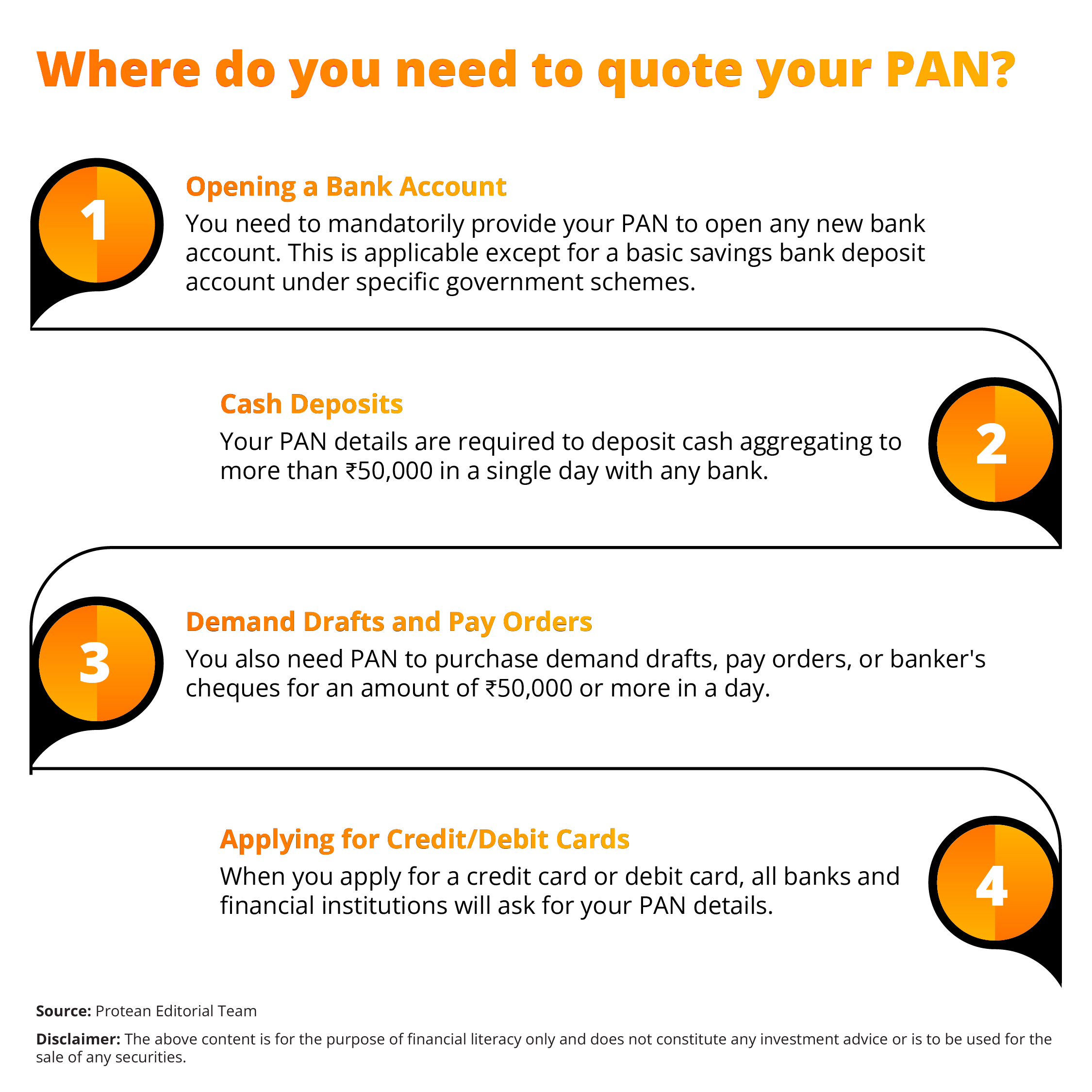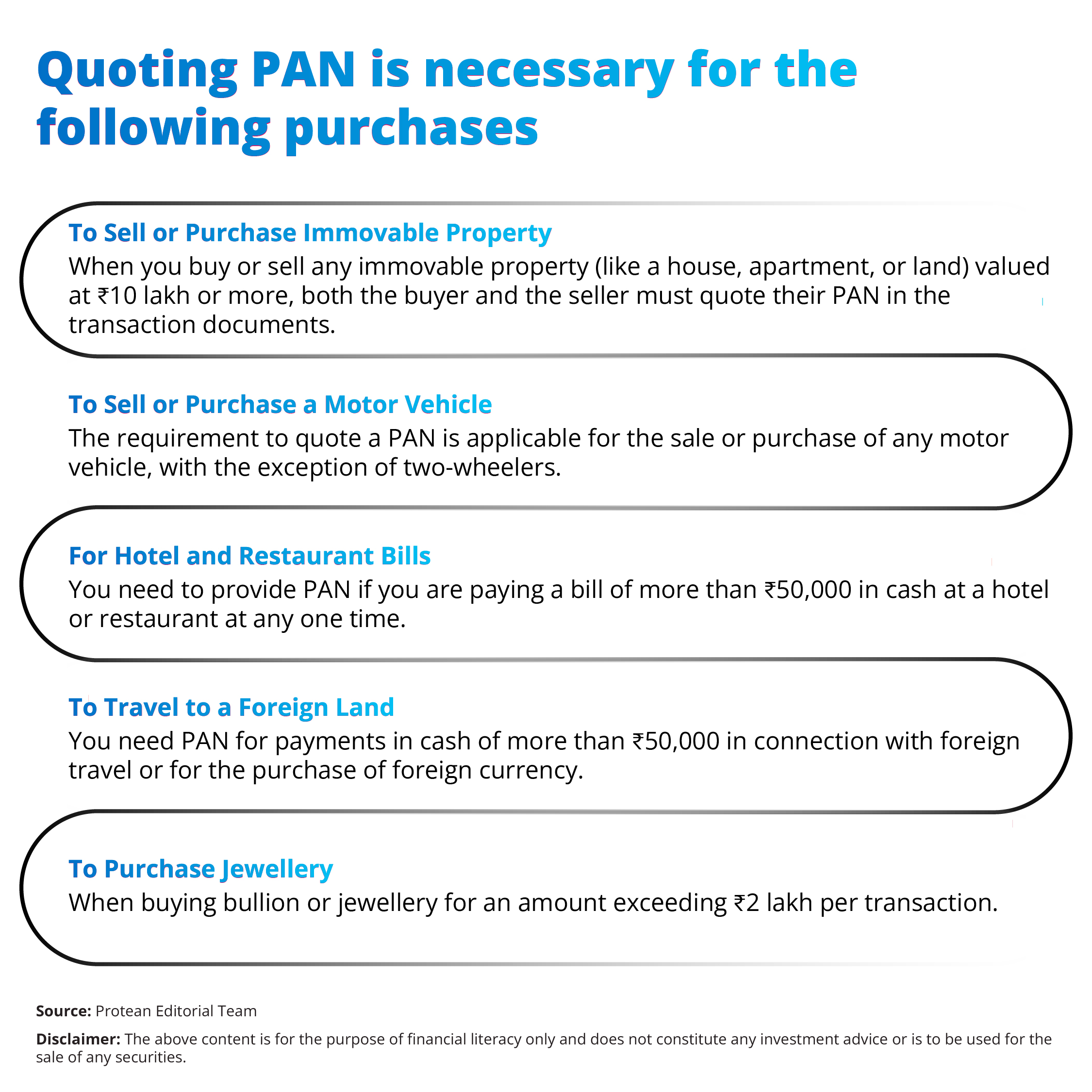Blogs
A comprehensive guide on where to use your PAN card
Have you ever thought about the importance of your PAN card?
Your PAN card can be one of the most powerful documents in your wallet. Often mistaken as just another identity card, its role can extend far beyond an identity proof document.
A PAN card is the key to a vast array of financial activities in India. It is therefore very important to understand where and when you need to use your Permanent Account Number (PAN).
With better understanding of using your PAN card online and offline, you can smoothly comply with your financial management.
Here is every scenario where your PAN card is indispensable.
What is a PAN Card? A Quick Refresher
The Permanent Account Number (PAN) is a unique 10 digit alpha-numeric identifier detail. It is issued by the Income Tax Department (ITD) of India. Its primary purpose is to serve as a universal identification for all financial transactions and to prevent tax evasion by linking an individual's transactions to their tax records. Every person or entity that engages in financial transactions needs this number.
Thankfully, you can apply for a PAN card online through portals like Protean eGov Technologies. The process for PAN card application online as well as offline is simple, streamlined and quick.
Core Banking and Financial Transactions
The most frequent use of your PAN card occurs within the banking sector. It is a fundamental requirement to have a PAN for most significant banking operations, except for some accounts like basic savings accounts under specific schemes. Having a PAN can ensure that the government can track the flow of money and curb illegal financial activities.

High-Value Purchases and Sales
The Government of India (GoI) has mandated the use of a PAN card for high-value transactions. They do this to monitor large expenditures and ensure they are consistent with an individual's declared income. This can help in identifying potential tax discrepancies.
Your PAN is necessary for the following purposes:

Investments and Insurance
The world of investments and insurance is heavily regulated, and the PAN is a cornerstone of this regulatory framework. It ensures transparency and helps track investments for tax purposes. Without a PAN card, participating in most investment avenues is nearly impossible.
Here is where your PAN is essential:
- Securities Market: You cannot enter the stock market without a PAN. It is mandatory for opening a Demat account, which is used to hold shares and securities in electronic form. Further, it is required for any transaction to buy or sell securities for an amount exceeding ₹1 lakh per transaction.
- Mutual Funds: Investing in mutual funds, regardless of the amount, requires you to provide details of your PAN card online. This applies to both lump-sum investments and Systematic Investment Plans (SIPs).
- Bonds and Debentures: For making an application for the allotment of debentures or bonds issued by a company or institution for an amount of ₹50,000 or more.
- Insurance Premiums: You must quote your PAN to the insurance company if premium payments exceed specified regulatory limits, commonly ₹50,000 in a financial year.
- Bank and Post Office Deposits: It is required for making time deposits (like Fixed Deposits) exceeding ₹50,000 at one time or aggregating to more than ₹5 lakh in a financial year with a bank, Post Office, or a Non-Banking Financial Company (NBFC).
The Most Important Use: Filing Income Tax
The primary and most critical use of the PAN is for all matters related to income tax. Here are the major points that you can consider:
- A PAN card is the foundation upon which India's tax system is built.
- Every individual, Hindu Undivided Family (HUF), company, or any other entities required to file income tax returns or conduct specified financial transactions must have a PAN card.
- It is mandatory to quote this number when filing Income Tax Returns (ITR).
- With the help of the PAN, the Income Tax Department (ITD) can create a complete financial profile of the taxpayer
- PAN can help the ITD ensure accurate assessment and collection of taxes.
What if You Don't Have a PAN? The Role of Form 60
What happens if a person needs to undertake one of the specified transactions but does not have a PAN card? Let us look at the solution to this scenario:
- The Income Tax (IT) Act provides a solution in the form of Form 60.
- An individual can submit a declaration in Form 60 stating that their income is below the taxable limit and they do not possess a PAN.
- However, this is a temporary workaround.
- For anyone who regularly engages in financial transactions, the most prudent course of action is to apply for a PAN card online.
- You can ensure compliance and avoid any hassles by having a valid PAN.
Conclusion
From opening a simple bank account to filing your income tax returns, the PAN card is an omnipresent requirement in your financial life. It can act as your unique financial fingerprint, allowing the government to maintain a transparent and efficient economic system. It is important to understand its various applications. Learning about different PAN usage scenarios can help you stay compliant and manage your finances effectively.
Always keep your PAN details secure and ensure your information on the card is up-to-date, as it is a foundational pillar of your financial identity in India.






